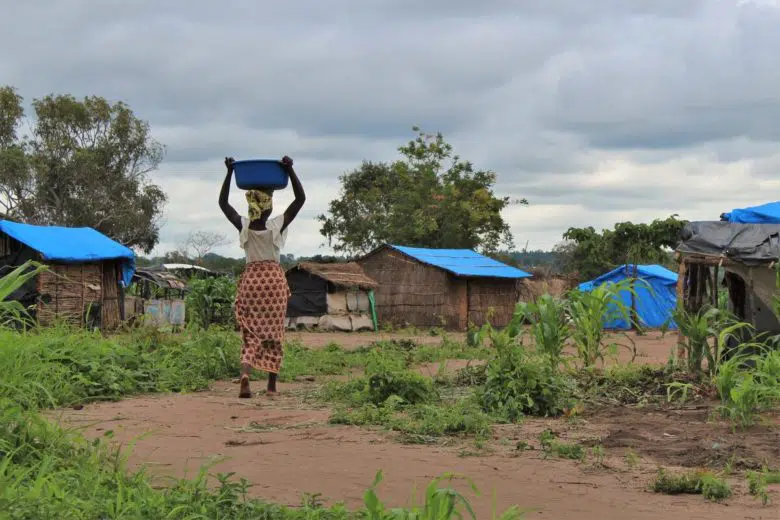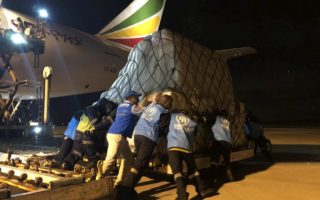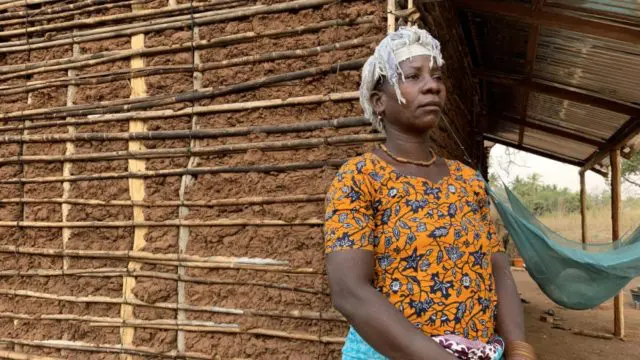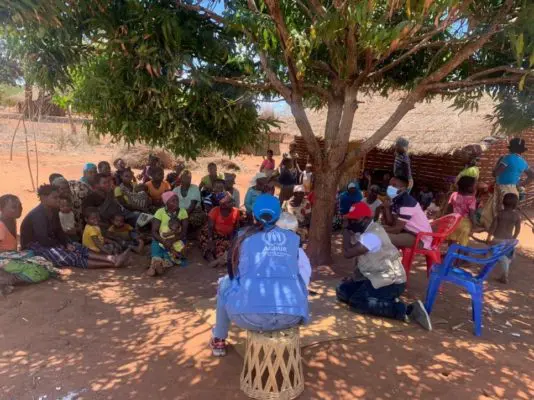
A woman walks through a site for internally displaced people in Mpeme, Mueda District, in Mozambique’s Cabo Delgado province. © UNHCR/Martim Gray Pereira
This is a summary of what was said by UNHCR spokesperson Boris Cheshirkov – to whom quoted text may be attributed – at today’s press briefing at the Palais des Nations in Geneva.
UNHCR, the UN Refugee Agency, is alarmed by the ongoing violence in northern Mozambique’s Cabo Delgado province, which has forced thousands to flee since the start of this year.
According to partners in the region, a series of attacks by non-state armed groups between January and mid-March displaced some 24,000 people within the Nangade district. They need urgent humanitarian assistance and protection services. Hundreds of families are reportedly still on the move.
Some 5,000 people have also sought protection in the neighbouring district of Mueda, a remote area bordering Tanzania. Those fleeing violence suffered and witnessed atrocities, including killings and the decapitation and dismemberment of bodies, sexual violence, kidnappings, forced recruitment by armed groups, and torture. The threat of renewed violence means the number of people arriving in Mueda continues to increase.
UNHCR and partners are working closely with local authorities to ensure that the needs of both recently and previously displaced communities in Mueda are addressed. We are providing shelter materials and household items to vulnerable families, monitoring protection risks, and supporting authorities to manage sites hosting the displaced. We are also establishing reception and communal facilities for internally displaced people at Lyanda and Nandimba.
Major gaps remain, however, especially in providing mental health and psychosocial support to unaccompanied and separated children, people living with disabilities, pregnant women and older people.
According to local authorities, Mueda district hosts 134,515 internally displaced people. Most sites are overcrowded and will soon reach capacity. Mueda is among the districts hosting the largest number of displaced communities within Cabo Delgado.
One year after non-state armed groups launched major attacks in the Palma district on 24 March 2021, leaving dozens dead and thousands displaced across Cabo Delgado, security remains fragile in some parts of northern Mozambique – despite improvements in other areas following the intervention of government and international allied forces since July 2021.
Since then, some people have chosen to return to their areas of origin. However, UNHCR considers it premature to encourage returns in Cabo Delgado, due to ongoing insecurity in parts of the province. UNHCR stresses the importance of ensuring that returns are safe, voluntary, conducted with dignity and based on an informed decision, and that basic services are restored in areas of origin.
Recent extreme climate events, such as Tropical Storm Ana in January and Tropical Cyclone Gombe this month, pose additional challenges to both displaced people and host communities in northern Mozambique.
Over 735,000 people have fled their homes since the conflict in Cabo Delgado started in October 2017. As of March 2022, UNHCR’s operations in Mozambique were only 11 percent funded out of a total of US$36.7 million required to deliver life-saving assistance.
Media contacts:
- In Maputo, Samuel Chakwera, Country Representative in Mozambique, chakwera@unhcr.org
- In Maputo, Juliana Ghazi, External Relations Officer ghazi@unhcr.org, +258 84 321 1545, +1 917 628 9073 (WhatsApp)
- In Pretoria (regional), Pumla Rulashe, rulashe@unhcr.org, +27 82 377 5665
- In Geneva, Boris Cheshirkov, cheshirk@unhcr.org, +41 79 433 7682
- In New York, Kathryn Mahoney, mahoney@unhcr.org, +1 347 443 7646
Originally published by UNHCR on 22 March 2022.





